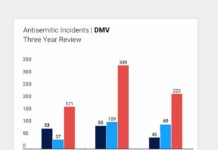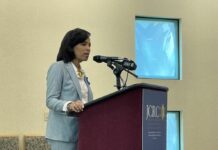
As lead impeachment manager, Rep. Jamie Raskin (D-Md.) headed the effort to convict President Donald Trump in his second Senate trial.
That 2021 impeachment, like the first a year earlier, ended in an acquittal.
Was it a total failure, though? Raskin argued no to an Alexandria audience last weekend.
“I call it the greatest case of jury nullification in history,” Raskin said. “I was crestfallen. But I’ve come to believe it’s a victory in the eyes of history.”
At an appearance at Beth El Hebrew Congregation to discuss his book “Unthinkable: Trauma, Truth, and the Trials of American Democracy,” Raskin spoke to the audience of 200 without relying on the printed page.
He said the second impeachment of Trump was the most bipartisan effort to impeach a president in history, and that it was a testament to enduring American democracy in the face of polarization. And he called for American leadership that cares about the public, not profit.
Also featured at the author event was Georgetown University professor Deborah Tannen.
Raskin’s book documents the impeachment following the Jan. 6, 2021, attack on the Capitol, during which Raskin was trapped inside with other legislators and Vice President Mike Pence. The insurrection came days after the death by suicide of Raskin’s son.
“We were all there, we were all victims, we were all witnesses of it,” Raskin said about the violence inside the Capitol. “It doesn’t need one or two years of hearings…. [we had] continuous interlinked efforts to defend American democracy against unprecedented internal assault. I thought the whole time, we were gonna win.”
Despite that, Raskin said, concerns about jurisdiction led to Trump’s acquittal.

Tannen, a professor of linguistics, focused on her 2020 book, “Finding My Father,” about her exploration of her father’s past.
The memoir follows her father’s journey from a large Chasidic family in Poland to the dozens of jobs he held in an economically unstable America. Even though he went to law school, he found employment as a factory worker, a tax inspector, a prison guard and a parole officer.
“He was the parent I felt an affinity with, but he was never there,” said Tannen, who has written books about mothers and sisters. “He was doing all these different jobs. He was very proud that he never went a day without work.”
Tannen said that when her father wasn’t busy, they would spend hours talking. And he left behind a fantastic paper trail of notes, receipts and documents.
“It’s almost like he appointed me to write this,” Tannen said of her book.
Robert Siegel, former host of NPR’s “All Things Considered,” read several excerpts of “Finding My Father.”
“Cheder [Jewish school] turned me against religion,” Siegel narrated one of Tannen’s father’s accounts, “One time the rabbi was telling us about a great holy man. He was so holy, the rabbi said, if you looked at him you’d go blind in one eye. If you looked at him again, you’d go blind in the other eye. And if you looked at him a third time, you’d be struck dead. I asked, ‘How can you look at him if you’re blind?’ He didn’t say anything. He just walked over and smacked me.”
The event was hosted by Beth El Hebrew Congregation’s Women of Reform Judaism group and the Northern Virginia chapter of the Brandeis National Committee.





